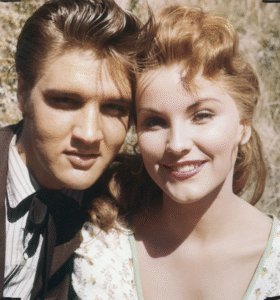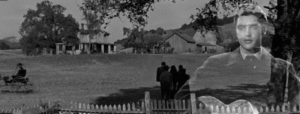The Hidden Details Behind Elvis Presley’s Love Me Tender The King’s Movie Debut Had More Secrets Than You Think

You might not realize it, but the full Love Me Tender film is currently available to watch on YouTube — and if you’ve never seen it, now’s the perfect time. It’s more than just a movie; it’s a glimpse into the early days of Elvis Presley, not just as a musician but as a rising film actor.
In Love Me Tender, Elvis doesn’t just sing—he steps into the world of cinema with a surprising natural ease. Released in 1956, the film blends drama, romance, and Western themes, unfolding during the Civil War era. It was also Presley’s silver screen debut, and it was met with fan frenzy. When the movie opened at New York’s Paramount Theater, over 1,500 fans waited overnight beneath a massive Elvis cutout just to be first through the doors. Inside, the excitement was so overwhelming that fans’ cheers often drowned out the dialogue.
A Different Name, A Bigger Legacy
Initially titled The Reno Brothers, the movie was renamed to align with the popularity of the title track — “Love Me Tender,” sung by Presley himself. The plot was inspired by the real-life Reno Gang, infamous for their post-Civil War train robberies in Indiana. This marked the only time Elvis ever portrayed a historical figure.
From Movie Usher to Movie Star
Long before becoming an international icon, Elvis worked in a movie theater, absorbing Hollywood magic. He idolized screen legends like James Dean and Marlon Brando and aspired to follow in their footsteps. But Colonel Tom Parker had different goals — he saw cinema as a tool to boost Elvis’s record sales.
Despite not being cast in the lead (others had already passed on the role of Clint Reno), Elvis impressed everyone on set. He memorized not just his own lines, but those of his co-stars, and completed his scenes and musical recordings in just over four weeks. Producer David Weisbart described him as humble, focused, and deeply committed.

More Screen Time for the King
Elvis was originally given a minor role, but once filming began, the studio realized his star power. They quickly expanded his part, adding dialogue and entire scenes to highlight his presence. Though Elvis had hoped not to sing in the film — wanting to be taken seriously as an actor — he was soon serenading the audience just minutes into the movie.
Historic Accuracy… Not Quite
Though the film aimed for a 19th-century setting, some moments break the illusion. In one scene, a soldier zips up trousers — a historical inaccuracy, as zippers weren’t invented until decades later. In another, a car can be seen parked in the background while Cathy Reno weeps by a window. And during “We’re Gonna Move,” Elvis appears to play the guitar… but the music continues even after his hands stop strumming.
The Song That Wasn’t Originally Elvis’s
The famous ballad “Love Me Tender” is actually adapted from a Civil War-era tune called “Aura Lee.” While Elvis was credited as a co-writer, he later admitted he only contributed one line — a detail that raised eyebrows but earned him a share of the royalties. The song was such a sensation that RCA received over one million advance orders after he performed it on The Ed Sullivan Show weeks before the movie’s release.
A Special Connection with Debra Paget
Debra Paget, the female lead, was already a well-known star at the time. She made quite the impression on Elvis, who reportedly fell for her during filming. According to interviews, he even asked her to marry him. Paget, however, declined — influenced partly by her parents and partly because she was in love with billionaire Howard Hughes. Interestingly, years later, Priscilla Presley adopted Debra’s hairstyle from Love Me Tender in hopes of catching Elvis’s eye.
Fans Changed the Ending
In the original cut, Clint Reno dies at the end — a plot point that devastated Elvis’s mother and many fans. In response, producers added a final scene showing Elvis’s silhouette singing during the credits. It was meant to soften the blow, though it introduced a continuity error: by that time, Elvis had dyed his hair black, while in the rest of the movie it’s a lighter shade.